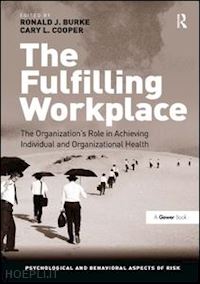Contents: Part I Nature of the Issues: The healthy organization: reducing high-risk individual behavior and organizational toxicity, Ronald J. Burke. Part II Optimal Individual and Organizational Outcomes: Becoming fully engaged in the workplace: what individuals and organizations can do to foster work engagement, Arnold B. Bakker, Wido G.M. Oerlemans and Lieke L. ten Brummelhuis; Experiencing flow in the workplace and what individuals and organizations can do to foster it, Evangelia Demerouti and Clive J. Fullagar; Passion in organizations, Adrian Furnham; The importance of social capital in the workplace and how individuals and organizations can support its development, Fred O. Walumba and Amanda L. Christensen. Part III Individual Resources: Person-situated dynamics and well-being at work: an achievement goal theory perspective, Christina G.L. Nerstad, Glyn C. Roberts and Astrid M. Richardsen; When pulling to the negative emotional attractor is too much or not enough to inspire and sustain outstanding leadership, Richard E. Boyatzis; The emotional intelligence response to coping with narcissism in the work place, Roy Lubit. Part IV Organizational Initiatives: Enhancing well-being in organizations through selection and development, Jill Flint-Taylor and Ivan T. Robertson; Meaningful work is healthy work, Paul Fairlie; Discrimination in the workplace and employee health, Robert L. Dipboye, Barbara A. Fritzsche and Lindsay Dhanani; Changing sexual harassment within organizations via training interventions: suggestions and empirical data, Vicki J. Magley, Louise F. Fitzgerald, Jan Salisbury, Fritz Drasgow and Michael J. Zickar; The relationship between work design and retirement: implications for organizational policy, Amanda Griffiths, Alec Knight and Nor Diana Mohd Mahudin; Creating a safe and healthy work environment: the latest thinking and research evidence, Sharon Clarke, Sara Guediri and Elinor O’Connor; Inculcating values-based leadership: one Canadian firm











